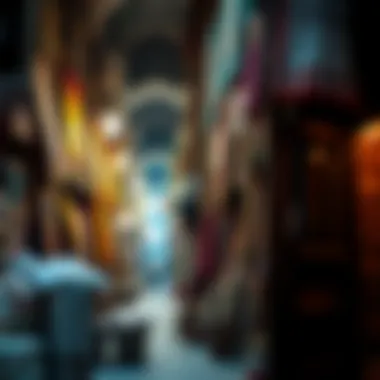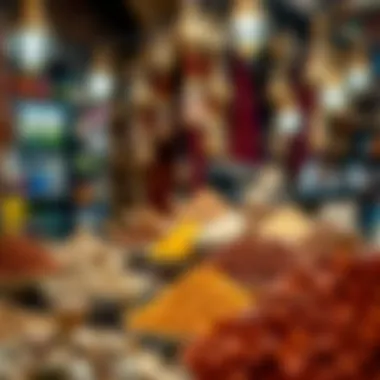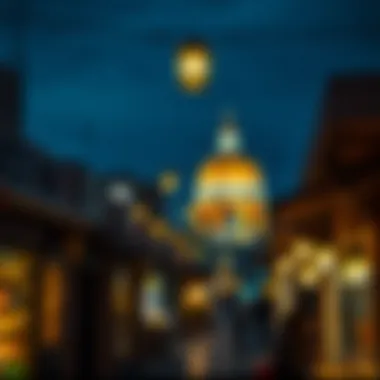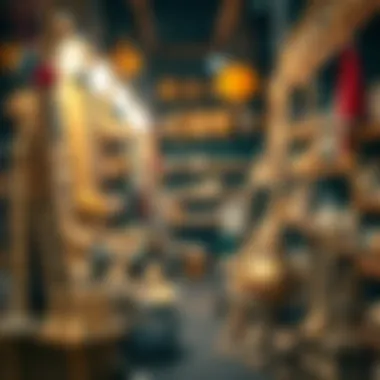Old Dubai Souk Hours: A Guide to Cultural Markets


Intro
When you think of Old Dubai, vibrant markets and the shimmering beauty of the historical landscape come to mind. With bustling souks offering everything from spice to textiles, these markets offer a glimpse into the city's rich heritage. However, one essential detail can determine the quality of your visit: the opening times of these enchanting souks. In this article, we will navigate through the operational hours of various souks in Old Dubai, enriching not just your shopping journey but your entire cultural experience.
The Significance of Opening Times
Visiting the souks during their ideal hours can elevate your experience significantly. For instance, arriving early in the morning lets you witness the vendors setting up, while late afternoon visits provide an opportunity to engage with locals as they wind down their day. Having knowledge of the operational hours thus offers a tactical advantage, turning a simple trip into an immersive dive into the history and culture of Old Dubai.
A Taste of Culture and Commerce
Part of the allure of the souks lies not just in the goods but in the charm of the experience itself. From bargaining for spices to sampling local perfumes, every minute spent in these markets unveils a unique slice of local life. You might think about not just what to buy, but also when to be there to savor the sights and sounds in their fullness.
The following sections will delve deeper into the opening times of key souks.
- Spice Souk
- Gold Souk
- Textile Souk
- Perfume Souk
Each of these offers a different atmosphere and a unique variety that can be savored better when you know precisely when to visit. As we move forward, be prepared to gather details that will inform not just your visit but elevate your understanding of this historic area significantly.
The Historical Significance of Old Dubai Souks
Old Dubai’s souks are more than mere marketplaces; they represent a thread stitched into the very fabric of the region's history and culture. These bustling hubs have long been focal points for trade, culture, and community interactions, playing a pivotal role in the development of modern Dubai. The evolution of these souks reflects the economic and social transformations that have shaped the city, and understanding their significance can offer valuable insights into Dubai's identity today.
A Brief Overview of Dubai's Market Evolution
To grasp the importance of the souks, we first need to look at how Dubai's markets have evolved throughout the years. Historically, before the skyscrapers and luxury malls emerged, Dubai was a modest trading post. Merchants from various lands would converge, bringing goods ranging from spices and textiles to gold and pearls. The early 20th century marked a turning point when the discovery of oil led to a rush of wealth. This shift transformed the economic landscape, pushing Dubai from a quiet coastal town into an international trade hub.
- Early Trading Practices: Long before modern infrastructure, trade routes connected Dubai to the Persian Gulf, facilitating the flow of merchants and goods. The geography played a crucial role in establishing the souks as central points of commerce.
- Impact of Globalization: In recent decades, with advancements in transportation and communication, the souks adapted, welcoming a more diverse clientele and goods. They’ve mixed traditional practices with modern influences, creating a unique customer experience.
- Regeneration Efforts: Local initiatives are now in play to preserve the souks' charm amidst rapid urban development. By balancing heritage with modern needs, Dubai's local government ensures the markets' cultural essence remains intact.
Cultural Importance of Souks in Arab Tradition
Souks are deeply rooted in Arab culture, acting as social connectors within the community. They foster relationships among locals and visitors alike, reflecting the communal life typical of traditional Arab society. Shoppers and merchants engage in lively conversations, often resulting in a friendly bargaining atmosphere that is unique to these spaces.
- A Hub for Community Interaction: The souks serve as gathering spots for friends and families. Beyond purchasing goods, people come to share stories, celebrate festivals, and enjoy the vibrant atmosphere.
- Cultural Mosaic: Each souk, whether it be the Gold Souk, Spice Souk, or Textile Souk, embodies a different facet of Middle Eastern culture. The sights, sounds, and smells encapsulate a sensory experience that is tied to the region’s heritage.
"The souks are a gateway to understanding the heart of Dubai, offering visitors a glimpse into the essence of Emirati culture and hospitality."
Detailed Guide to Old Dubai Souk Opening Times
Navigating the bustling markets of Old Dubai is a journey that intertwines heritage with modern commercial dynamics. Understanding the opening times of the souks not only enriches the visitor's experience but also maximizes the potential for cultural exposure. In a city that thrives on its unique blend of tradition and innovation, knowing when each souk buzzes with activity is vital. Whether you're a seasoned traveler or new to the scene, the operational hours of these markets can play a significant role in how one engages with the environment.
This guide aims to delve into the specifics of each souk's opening times, unraveling patterns and variances that may affect when one might choose to explore. By comprehensively detailing these times, we shed light on a practical aspect that often remains in the background but is crucial for a fulfilling visit.


General Hours of Operation
Most of the souks in Old Dubai typically adhere to a structured schedule that facilitates visitors. Generally, the operating hours start around 10:00 AM and extend until 10:00 PM, though it's worth noting the peaks and troughs of foot traffic. For example, shops in the Gold Souk may be more populated in the evenings, especially close to weekends, when local and tourist activity is heightened.
Conversely, some souks may close earlier, especially during the hottest months of summer when footfall drops significantly. Shoppers should consider arriving earlier in the day to avoid the midday heat and experience a quieter atmosphere where bargaining becomes more personal. It’s common for many vendors to take breaks during the afternoon, often closing their stalls briefly between 1:00 PM and 4:00 PM before resuming operations and staying open late into the night.
"Knowing the rhythm of Old Dubai souks allows you to seize the best moments, as the early bird truly does catch the worm in this vibrant marketplace."
Seasonal Variations in Opening Times
Seasonal changes have an undeniable impact on operational hours, closely related to tourism peaks, local festivities, and even climate. The cooler months, spanning from October to March, witness an influx of visitors, causing many souks to extend their hours to accommodate the heightened interest. During this time, you might find stalls remaining open as late as midnight, attracting night owls drawn to the vibrant atmosphere.
In contrast, the sweltering summer months typically see adjusted hours, with many shops opting for shorter days. Local businesses might close by 9:00 PM, as temperatures soar during the day, driving people indoors. Visitors planning to explore during Ramadan, a month of fasting, should also be mindful; many souks will alter their operating hours to align with prayer times, usually opening later in the day and remaining open well into the night hours.
Here’s a brief overview of potential seasonal changes to keep in mind:
- Peak Season (October – March): Extended hours, open later in the evening, vibrant atmosphere.
- Summer Months (June – September): Shorter hours, typically closing by 9:00 PM, heat deters early afternoon foot traffic.
- Ramadan: Shifted hours to accommodate fasting times, peak hours are often late at night.
Understanding these dynamics is crucial for a successful visit, allowing visitors to plan ahead and experience Old Dubai's rich cultural tapestry to its fullest.
Highlighted Souks in Old Dubai
Old Dubai’s souks are not just markets; they are alive with stories, aromas, and a vibrant tapestry of cultural heritage. Each souk reflects unique characteristics, offering visitors not just a place to shop but also an authentic experience of Arabic life. Understanding the hours of these souks not only allows for effective planning but also enhances the overall visit, ensuring an encounter with the soul of the city.
The Gold Souk
Typical Opening Hours
The Gold Souk is renowned for its glittering displays and an extensive variety of jewelry, making it a must-visit for anyone exploring Old Dubai. Typically, this souk opens its doors from 10:00 AM to 10:00 PM daily. This timeframe is especially beneficial for those who prefer to browse at a leisurely pace. The late closing hours give ample opportunity for evening visits, where the shop windows twinkle with gold pieces against the backdrop of the twilight sky.
What sets the Gold Souk apart in terms of timing is its evening allure; many visitors find it more comfortable to explore after the sun goes down, when temperatures cool and the atmosphere becomes charged with excitement. However, it is essential to consider that foot traffic can vary dramatically; mid-morning or late afternoon may present a less crowded experience, enabling more personal interaction with vendors.
Best Days to Visit
In considering the best days to visit the Gold Souk, weekends (Friday and Saturday) are often bustling with both tourists and locals. These days showcase a vibrant energy you won’t want to miss. However, if someone prefers a quieter experience, visiting on a weekday, particularly Sunday to Thursday, is advisable. During these days, shoppers can enjoy a more relaxed environment, which allows for better appreciation of the craftsmanship and unique pieces on offer.
This nuanced understanding of timing not only aids in navigation but also highlights the sociocultural fabric of Dubai, where shopping is more than commerce; it’s an event.
The Spice Souk
Regular Operating Hours
The lifeblood of the Spice Souk is its tantalizing scents that beckon visitors from afar. Typically, the Spice Souk operates from 9:00 AM to 10:00 PM. These hours conveniently overlap with tourists' schedules, enabling them to engulf themselves in the myriad spices and aromas without the worry of rushing through their experience. The typical hours cater nicely to anyone keen on exploring Dubai’s culinary scene, particularly those interested in packing spices to take back home.


This timing seems to sync perfectly with food lovers and culinary enthusiasts, as morning visitors can engage with vendors who often share recipes or cooking tips while showcasing their spices. However, it can start to get rather busy as midday approaches, so early birds might have the advantage in getting more personalized experiences.
Peak Activity Times
Peak activity in the Spice Souk generally occurs in the late morning, around 11:00 AM to 1:00 PM. During these hours, the marketplace hums with both locals and tourists, creating a vibrant tapestry of chatter and exchange. This high traffic can enhance the electric atmosphere, but it can also mean longer waits to interact with vendors or make purchases.
Visiting earlier or later in the day can sometimes yield a more intimate experience, allowing for a deeper engagement with the many flavors and aromas this souk has to offer. Knowing when these peaks occur can dramatically improve a visitor’s overall experience, ensuring they get the most out of their exploration.
The Textile Souk
Common Hours for Shoppers
The Textile Souk is a haven for those in search of fabrics, pashminas, and traditional attire. Commonly, this souk welcomes shoppers from 10:00 AM until 10:00 PM daily. These extended hours allow visitors to sift through the rich offerings of handcrafted goods at their pace, contributing to a more thorough exploration of the styles and fabrics on display.
Such hours are advantageous, especially for those looking to compare different fabrics or seek advice from shopkeepers. The friendliness often exhibited in this souk can foster a sense of community among shoppers, enhancing not just the shopping but also the entire cultural experience.
Seasonal Considerations
When considering seasonal variability, the Textile Souk remains consistent throughout the year, but its ambiance can shift dramatically during major shopping festivals or holidays. For instance, during Ramadan, the opening hours may extend or shift to accommodate evening shopping sprees. Tours during this time can immerse visitors in the festive spirit of Dubai, blending shopping with cultural traditions like iftar, which can be a remarkable experience.
Unique Aspects of Souk Experiences
Visiting the souks in Old Dubai is not just about shopping; it's an entire experience that weaves together history, culture, and community. Each souk has a unique character, shaped by the specific goods they sell and the stories etched into their walls. For anyone looking to immerse themselves in the essence of Dubai, understanding these nuances is vital. They offer more than just merchandise; they provide insights into traditional practices and the daily lives of local people.
Cultural Events and Their Impact on Visiting Hours
Cultural events profoundly affect the atmosphere of the souks and their opening hours. During Ramadan, for example, many souks may open later in the day, accommodating the changing rhythms of life as people fast during daylight hours. This shift doesn't merely alter visiting hours, it creates a unique experience. Strolling through the souks in the evening, as the sun sets, offers a different ambiance — the air is cooler, the market is bustling, and the aroma of spices fills the evening air.
Moreover, festivals or exhibitions can lead to extended hours. Events memorializing Dubai’s heritage, for instance, might see vendors showcasing traditional goods, enticing visitors with cultural performances. Make sure to check the local calendar when planning your trip; periods like the Eid celebrations are particularly lively.
"The best time to engage with the local culture is during festivals when the souks come alive with colors, sounds, and tastes!"
To summarize, understanding these cultural events not only allows visitors to enjoy the souk’s offerings but also helps in experiencing Dubai's vibrant traditions and community spirit. It ensures you don’t just step into a market but walk into a living, breathing part of the city’s cultural heritage.
Holidays and Variability in Opening Times
The souks also exhibit variability in opening times during public holidays. For example, during national holidays like UAE National Day and Independence Day, certain shops might close or open late, depending on the owners’ preferences to celebrate with their families or communities.
Therefore, to avoid ending up with a closed shop on a planned visit, an awareness of these holidays is crucial. Some shops may adjust their hours even more during the peak tourist season, providing extended evening hours that accommodate increased foot traffic.
It's wise to keep an eye out for sporadic closures or special promotional hours, as some vendors have been known to flex their hours around high-demand shopping periods, such as during Dubai Shopping Festival. This adaptability enhances the experience for genuine shoppers while maintaining the owner’s connection to family and tradition.


Practical Tips for Visitors
Visiting Old Dubai's souks can be an unforgettable experience, but navigating the vibrant maze of market stalls and bustling crowds can be a bit overwhelming. Practical tips can help you make the most of your visit. This section aims to enhance your experience by providing smart strategies, essential considerations, and valuable insights into planning your journey around the souk hours.
Planning Your Visit Around Souk Hours
Timing is everything when it comes to exploring Old Dubai's souks. Many of these markets have specific operating hours that may not coincide with your itinerary. Here’s what you should consider:
- Early Bird Advantage: Arriving at the souks early in the morning can offer a quieter experience. You'll have the opportunity to shop without the heavy foot traffic that builds as the day progresses.
- Lunch Breaks: Some traders might close shop during traditional lunch hours, especially during the hot summer months. It's wise to map out your visit accordingly and check for lunch breaks, especially during Ramadan when timings can shift significantly.
- Evening Wonders: Many souks stay open late into the evening. This not only allows for a cooler stroll through the markets but also opens up the possibility of enjoying a different ambiance with various cultural activities often occurring after sunset.
Remember to cross-check local calendars for seasonal events, as they can impact both the foot traffic and the experience.
Navigating the Souks Efficiently
Once you've honed in on the ideal times for your visit, the next step is figuring out how to navigate these bustling arenas of commerce:
- Wear Comfortable Shoes: You’ll likely be doing a fair amount of walking. Casual footwear can make a world of difference, especially if you plan to wander through multiple souks.
- Have a Game Plan: Each souk specializes in unique goods. Prioritize visits based on your interests. If you’re looking for spices, head straight to the Spice Souk. For textiles or souvenirs, the Textile Souk is the place to be.
- Follow the Sights and Sounds: If you start to feel lost, simply paying attention to the sounds—lively banter, sizzling snacks, or the gleam of gold—can guide you toward your destination.
- Ask for Assistance: Don’t hesitate to approach shop owners or fellow visitors for directions or recommendations. Most locals are friendly and open to helping tourists find their way.
Being strategic can turn what may seem chaotic into a pleasant adventure.
Safety Considerations When Visiting
Safety should always top your list of priorities when exploring crowded places. Here are a few tips to ensure a secure and enjoyable experience:
- Keep Valuables Secure: With a mix of locals and tourists, crowds can become dense. Keep your belongings close and avoid displaying expensive items openly. A crossbody bag can be a safer option than a backpack.
- Stay Aware of Surroundings: It's vital to remain vigilant in crowded areas where pickpockets might be present. Keep your head up and be conscious of who’s around you.
- Know Your Rights: Most traders are fair, but ensure you're aware of local customs regarding negotiations. If you feel uncomfortable in a situation, trust your instincts and walk away.
"Trust your gut. If something feels off, it probably is."
- Hydration Matters: Dubai’s heat can be intense, especially during summer. Carry a bottle of water and stay hydrated as you explore the souks. It’ll keep your energy up and your mind sharp.
Ending
In wrapping up the exploration of Old Dubai’s souk opening times, it becomes clear just how crucial these traditional markets are, not only to the local economy but to the very identity of Dubai itself. With a blend of history, culture, and commerce, the souks offer a microcosm of Dubai’s journey, reflecting its transformation from a modest trading post to a bustling metropolis. Understanding the operational hours of these souks allows visitors to navigate this vibrant landscape efficiently, maximizing their experience.
Recap of Souk Importance and Visiting Strategy
The souks of Old Dubai serve as essential hubs of social and economic interaction. Each souk contributes uniquely to the tapestry of Dubai’s history. For instance, the Gold Souk entices with its dazzling array of jewelry, while the Spice Souk offers a sensory buffet of aromas and flavors, uniting tradition and taste. Planning visits around the operating hours for each souk can elevate the experience significantly. Tourists and locals alike should aim to visit during weekday mornings to avoid the crowds, as weekends often find these markets buzzing with activity.
Key reasons to consider the timing of your visit include:
- Less Crowded Atmosphere: Early hours on weekdays can provide a more leisurely shopping and browsing experience.
- Engagement Opportunities: Visiting during peak hours can offer insight from local vendors about their crafts, making for a richer cultural exchange.
- Cultural Activities: Some souks host cultural performances or festivals that could coincide with special days. Aligning your visit accordingly means you won't miss out on these unique experiences.
Final Thoughts on Old Dubai's Cultural Heritage
As the sun sets over the bustling alleys of the Old Dubai souks, it becomes evident that these markets are more than just retail spaces. They embody the spirit of the community and preserve a way of life that has endured through the years. The melding of modernity and tradition within these souks tells a story — one that echoes through the shop fronts of the Gold, Spice, and Textile Souks.
By immersing oneself in the culture and timing of these markets, visitors can enrich their understanding of Dubai's heritage. The insights gained from experiencing the rhythms of souk life deepen the connection to the history and values of this region. Therefore, appreciate the importance of knowing the right time to visit these iconic souks as you embark on this journey through Old Dubai — savor every moment and learn from the vibrant stories that unfold within their walls.
"The souks of Dubai are not just places to shop; they are living museums of culture, history, and the human spirit."







